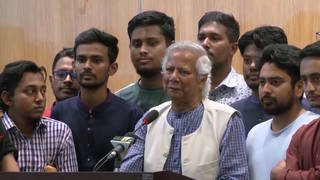
We go to Dhaka for an update as Nobel Peace Prize laureate Muhammad Yunus is sworn in to lead Bangladesh’s caretaker government just days after the ouster of Prime Minister Sheikh Hasina, who resigned and fled the country amid a wave of student-led protests over inequality and corruption. Yunus is known as the “banker to the poor” and was awarded the Nobel Peace Prize in 2006 for his work developing microloans that helped lift millions out of poverty. Yunus thanked Bangladeshi youth for giving the country a “rebirth” and vowed to work for the public good.
“This is uncharted territory,” says Shahidul Alam, an acclaimed Bangladeshi photojournalist, author and social activist, who has spent decades documenting human rights abuses and political and social movements in the country. Alam was jailed in 2018 for his criticism of the government and spent 107 behind bars, during which time he says he was tortured by the authorities. “This repression has taken such a toll on so many people for so long, the nation is just hugely relieved.”
We also speak with Nusrat Chowdhury, an associate professor of anthropology at Amherst College and author of Paradoxes of the Popular: Crowd Politics in Bangladesh. She says it’s very significant that student leaders are being brought into the new government and says Yunus is a rare public figure in Bangladesh who exists “beyond party politics” and has the chance to unify the country.
This content originally appeared on Democracy Now! and was authored by Democracy Now!.